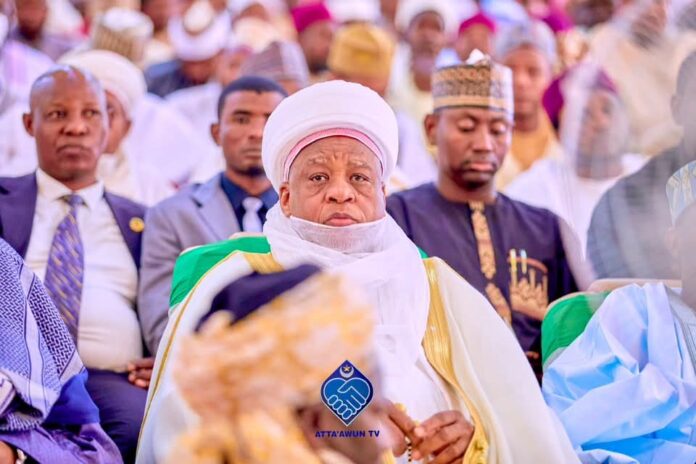— Clarifies That Islamism Promotes Good Governance, Not Power Seizure
By:Abdullahi Inuwa
The Sultan of Sokoto and President-General of the Nigerian Supreme Council for Islamic Affairs (NSCIA), His Eminence Alhaji Muhammad Sa’ad Abubakar III, has offered a firm clarification on the meaning and intent of Islamism, responding to recent remarks made by Bishop Matthew Hassan Kukah of the Catholic Diocese of Sokoto.
Speaking during a media engagement covered by Arise TV, the Sultan said Bishop Kukah’s reference to Islamism may have been misunderstood or wrongly framed, leading some to perceive Islam in a negative light. He emphasized that the concept of Islamism, far from being about political dominance, is rooted in the promotion of justice, equity, and good governance in society.
“And I want to also correct what Bishop Kukah said about Islamism,” the Sultan stated. “You used some words maybe in a wrong manner, or somebody might feel Islam is negative. Islamism is not aimed at seizing power at any particular forum. Islamism is after good governance in society and whoever is there.”
The Sultan, who has long been a strong voice for interfaith harmony and national unity, stressed that Islam’s teachings emphasize service to humanity and moral integrity in leadership, irrespective of religion or political affiliation.
Citing past examples, he pointed to the support Muslim leaders extended to former President Goodluck Jonathan, a Christian, as evidence that their commitment lies not in religious partisanship but in the pursuit of responsible governance.
“President Jonathan was president. We gave him 100% support throughout his presidency. Nobody said anything negative about him. He knows that, and he’s here,” the Sultan said. “So Islamism is not what you think it is. It’s a wrong notion that you are bringing up here — that it’s to seize power. It’s not to seize power. We are after good governance.”
The monarch’s remarks come amid renewed discussions about the role of religion in Nigeria’s political life, a recurring theme that often sparks national debate. The Sultan, however, urged caution in how religious concepts are presented in public discourse, warning that careless language could reinforce stereotypes or misunderstandings.
He recalled a similar instance in 2019 when a speech he gave on “Islam and Good Governance in Nigeria” was misinterpreted by sections of the media as a political jab at then-President Muhammadu Buhari, who was seeking re-election at the time.
“In September 2019, I gave a talk on Islam and good governance in Nigeria. President Buhari was just going for a second term,” he recounted. “After I finished my talk, the following day, papers carried that I was aiming at President Buhari’s second term because I said things that a good Muslim should do as a leader and what he should not do. And these are written.”
He explained that his remarks were purely doctrinal, drawn from Islamic principles on leadership and responsibility, not political commentary.
“So we have a code. We have a code of conduct. We have ways and means of life — the Holy Qur’an, the Hadith of our most noble Prophet Muhammad (SAW), and the consensus of the ulama — the clerics. These are the three things guiding us,” the Sultan stated.
He further explained that Islamism, in its true sense, embodies the quest for righteousness, fairness, and service to the people, emphasizing that any leader, Muslim or non-Muslim, who upholds these values is supported by Islam’s ethical framework.
The Sultan’s intervention has drawn commendation from religious and civic leaders who view his clarification as an important step in promoting mutual understanding between faith communities in Nigeria.
Observers note that both the Sultan and Bishop Kukah have maintained cordial relations over the years, often collaborating on issues of peacebuilding, national cohesion, and the protection of citizens’ rights. The Sultan’s latest remarks, therefore, are seen not as confrontation but as a constructive correction — a continuation of interfaith dialogue grounded in respect and clarity.
In a nation often divided along religious lines, the Sultan reiterated that both Muslims and Christians share a common moral duty to speak the truth, promote justice, and hold leaders accountable, irrespective of faith.
“Our aim is not power; our aim is justice and good governance,” he said. “If a leader does well, we will commend him. If he fails, we must remind him of his duty — that is what Islam teaches.”
As Nigeria continues to grapple with insecurity, economic hardship, and political mistrust, the Sultan’s message resonates deeply with citizens yearning for responsible leadership and unity across faiths.
His words serve as a reminder that religion, when properly understood, remains a force for good — one that calls for compassion, accountability, and service, not division or dominance.
“We must use religion to build bridges, not walls,” the Sultan concluded. “Islam stands for peace, fairness, and good governance — and that is the message we must continue to preach.”
With his intervention, the Sultan once again underscored his role not only as the spiritual leader of Nigerian Muslims but also as a national statesman committed to truth, tolerance, and the moral renewal of leadership in Africa’s most populous nation.
— Ends




